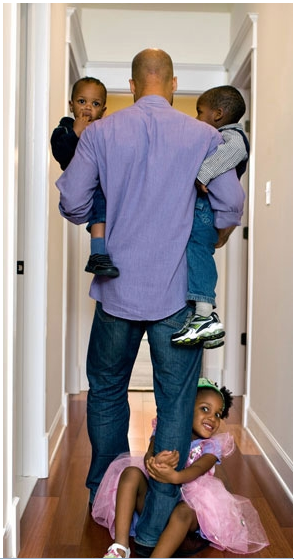
Science and Technolgy.
科技。
The joys of parenthood.
為人父母的快樂。
Father's day.
父親節。
Having children really does make a man more content with life.
擁有子女確實能讓男人對生活更加滿意。
WILL fatherhood make me happy? That is a question many men have found themselves asking, and the scientific evidence is equivocal. A lot of studies have linked parenthood-particularly fatherhood-with lower levels of marital satisfaction and higher rates of depression than are found among non-parents.
父親的身份能讓自己幸福快樂嗎?很多男人都會問自己這個問題,但是至今依然沒有一個明確的科學解答。很多關于父母身份(特別是父親)的研究都顯示,有子女的父母有著更低的婚姻滿意度和更高的憂郁癥比例。
Biologically speaking, that looks odd. Natural selection might be expected to favour the progeny of men who enjoy bringing them up. On the other hand, the countervailing pressure to have other children, by other women, may leave the man who is already encumbered by a set of offspring dissatisfied.
從生物學角度來說,這有點奇怪,因為自然選擇趨向于選擇那些樂于帶孩子男人的后代,反過來看,男性要和其他女性生育更多子女的壓力可能會讓那些已有子女的父親感到不滿。
To investigate the matter further Sonja Lyubomirsky, a psychologist at the University of California, Riverside, decided both to study the existing literature, and to conduct some experiments of her own. The results, just published in Psychological Science, suggest parenthood in general, and fatherhood in particular, really are blessings, even though the parent in question might sometimes feel they are in disguise.
來自加州大學河濱分校的心理學家Sonja Lyubomirsky進行了更為深入的研究,她從現有文獻和自己的實驗同時入手,其結果發表在《心理學》上。研究表明,父母身份,特別是父親的身份是相當重要的,盡管那些問題父母有時候可能并沒有注意這一點。
Dr Lyubomirsky's first port of call was the World Values Survey. This is a project which gathers huge amounts of data about the lives of people all around the planet. For the purposes of her research, Dr Lyubomirsky looked at the answers 6,906 Americans had given, in four different years, to four particular questions. These were: how many children the responder had; how satisfied he (or she) was with life; how happy he was; and how often he thought about the meaning and purpose of life.
Lyubomirsky博士首先進行世界價值觀調查,這個步驟要收集生活在世界各地的人的大量數據。為了達到研究目的, Lyubomirsky博士在四個不同的年份分別詢問了6906個美國人四個不同的問題,這四個問題分別是:受訪者有多少個孩子;他(或她)對生活有多滿意;他有多幸福;他多久考慮一次生命的意義。
She found that, regardless of the year the survey was conducted, parents had higher happiness, satisfaction and meaning-of-life scores than non-parents. The differences were not huge, but they were statistically significant. Moreover, a closer look showed that the differences in happiness and satisfaction were the result of men's scores alone going up with parenthood. Those of women did not change.
她發現,比起沒有子女的父母,有子女的父母有著更高的幸福感、滿意度和生活意義分數。雖然差距不算太大,但統計上很明顯,此外,深入分析后發現,在幸福感和滿意度上的差距主要來自于父母身份中父親的分數,女人的分數對其影響不大。
Armed with this result, Dr Lyubomirsky conducted her own experiment. The problem with projects like the World Values Survey is that, because participants are asked to recall their feelings rather than stating what they are experiencing in the here and now, this might lead them into thinking more fondly in hindsight about their parenting duties than they actually felt at the time. Dr Lyubomirsky therefore gave pagers to 329 North American volunteers aged between 18 and 94, having first recorded, among other things, their sex, age, ethnicity, socioeconomic status, marital status and number of children. She told them they would be paged at random, five times a day. When they were so paged, they were asked to complete a brief response sheet about how they felt, then and there. She did not, however, tell them why she was asking these questions.
根據這個結果,Lyubomirsky博士開始著手自己的實驗。但是在調查世界價值觀的時候還存在一些問題,因為受訪者是被要求回憶他們當時的感受,而不是描述此時此刻正在經歷的事,事后的覺悟可能會讓他們把作為父母的責任想得更令人喜愛。所以Lyubomirsky博士在北美選擇了329位18至94歲的志愿者,并給他們配備了尋呼機,此外,記錄原始數據還包括他們的性別、年齡、種族、社會地位、婚姻狀況和子女的數目。她告訴志愿者她會隨機呼叫他們,每天5次,當他們被呼叫時,他們會被要求完成一份簡短的回復表,這個表主要是關于他們當場感覺,但是她并沒有告訴他們她為什么要問那些問題
The upshot was the same as her findings from the World Values Survey. Parents claimed more positive emotions and more meaning in their lives than non-parents, and a closer look revealed that it was fathers who most enjoyed these benefits. Moreover, further analysis revealed that this enhanced enjoyment came from activities which involved children rather than those (such as watching television alone, or cooking) that did not.
實驗結果和世界觀調查結果一樣,比起無子女的雙親,正常父母有著更加積極的情緒和更好的生活體驗,并且父親們更加享受這份關系。此外,深入研究還發現與子女相關的活動比沒有子女父母的活動(比如獨自看電視,做飯)更能增加快感。
It looks, then, as if evolution has bolted into men a psychological mechanism to keep them in the family. At first sight, it is strange that women do not share this mechanism, but perhaps they do not need to. They know, after all, that the children are theirs, whereas the best a man can do is hope that is true. That, and a man's potential to father an indefinite number of offspring if he can find willing volunteers, might encourage him to stray from the bosom of his family. Enjoying fatherhood, by contrast, will help keep him in the porch.
在這一點看來,就像進化論把男人帶入了"融入家庭"的心理機制,女人們卻沒有分享到這個特性,乍看之下還有點奇怪,這或許是因為她們根本不需要,畢竟孩子總是她們的,而男人最多只能祈禱孩子確實是自己。此外,如果能找到情投意合的異性,男人總有與其產下更多后代的潛在欲望,這些都會驅使男性偏離家庭生活,所以還是讓他好好享受為人之父的快樂,這才會讓他樂意留在家里。











